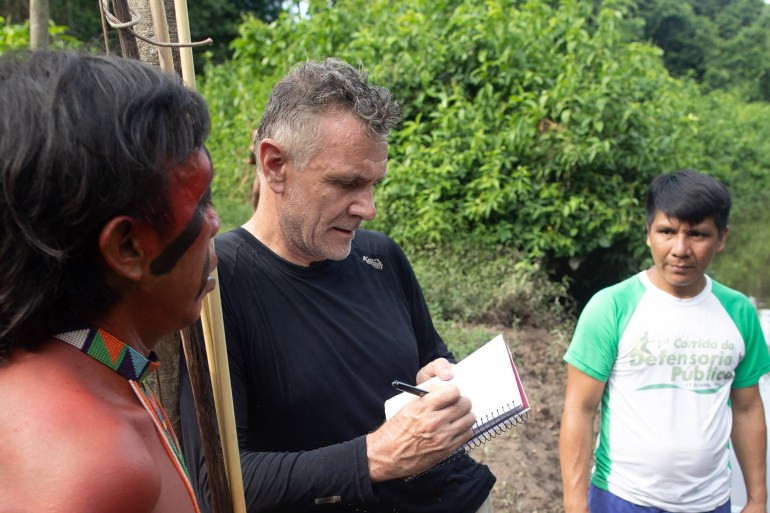Brazil: Police say no bodies found in search for missing men
Police and an Indigenous association say the search in the Amazon continues for a missing British journalist and an Indigenous expert.

Brazilian police and an Indigenous search group have dismissed reports that they found the bodies of British journalist Dom Phillips and Indigenous expert Bruno Pereira, who went missing in the Amazon rainforest more than a week ago.
Phillips and Pereira were last seen on June 5 while on a reporting trip in the Javari Valley, a remote jungle area near the border with Peru and Colombia.
Keep reading
list of 3 itemsBrazilian authorities search for missing UK journalist, expert
Search continues for Indigenous expert, British writer in Brazil
Authorities said on Sunday that they had recovered in a river several items belonging to Phillips, a contributor to The Guardian and other news outlets, and Pereira, a former official with Brazil’s federal Indigenous agency, Fundacao Nacional do Indio (FUNAI).
On Monday, The Guardian reported that two bodies believed to be the men’s were recovered in the search. Paul Sherwood, Phillips’ brother-in-law, told the newspaper that an aide to the Brazilian ambassador to the United Kingdom told the family that “they had found two bodies”.
Brazilian President Jair Bolsonaro also said on Monday that “human innards were found floating in the river, which are now undergoing DNA testing”, the AFP news agency reported.
But a federal police statement and a spokesman for the Union of Indigenous Peoples of the Javari Valley (UNIVAJA), which has organised search efforts, later denied the reports that two bodies were turned up.

“I’ve spoken with the team in the field and it’s not true,” said Eliesio Marubo, a lawyer for UNIVAJA. “The search goes on.”
The men’s disappearance has prompted global alarm and urgent calls for action, with politicians, press freedom groups, journalists and Indigenous leaders in Brazil demanding that Bolsonaro’s government devote more resources to find them.
“We ask that you urgently step up and fully resource the effort to locate Dom and Bruno, and that you provide all possible support to their families and friends,” a group of international news editors wrote in a letter to the far-right leader last week.
Bolsonaro also drew criticism when he said that the pair “were on an adventure that is not recommended” and suggested that they could have been executed.
Hundreds of people from several Indigenous groups took to the narrow streets of Atalaia do Norte, the closest city to the search, to protest the men’s disappearance on Monday.
With traditional garments, bows and arrows and mobile phones, they carried placards criticising Bolsonaro, who is widely seen as an opponent of Indigenous rights.
Authorities said during the weekend that a main line of the police investigation into the disappearance points to an international network that pays poor fishermen to fish illegally in Brazil’s second-largest Indigenous territory.
But federal police have not ruled out other lines of investigation, such as drug trafficking.
The Javari Valley is home to the world’s largest number of uncontacted Indigenous people. The wild and lawless region has lured cocaine-smuggling gangs, along with illegal loggers, miners and hunters.
The only known suspect so far is fisherman Amarildo da Costa de Oliveira, also known as Pelado, who is under arrest. Indigenous people who were with Pereira and Phillips say he brandished a rifle at them the day before they disappeared.
He has denied any wrongdoing and said military police tortured him to try to get a confession, his family told The Associated Press news agency.